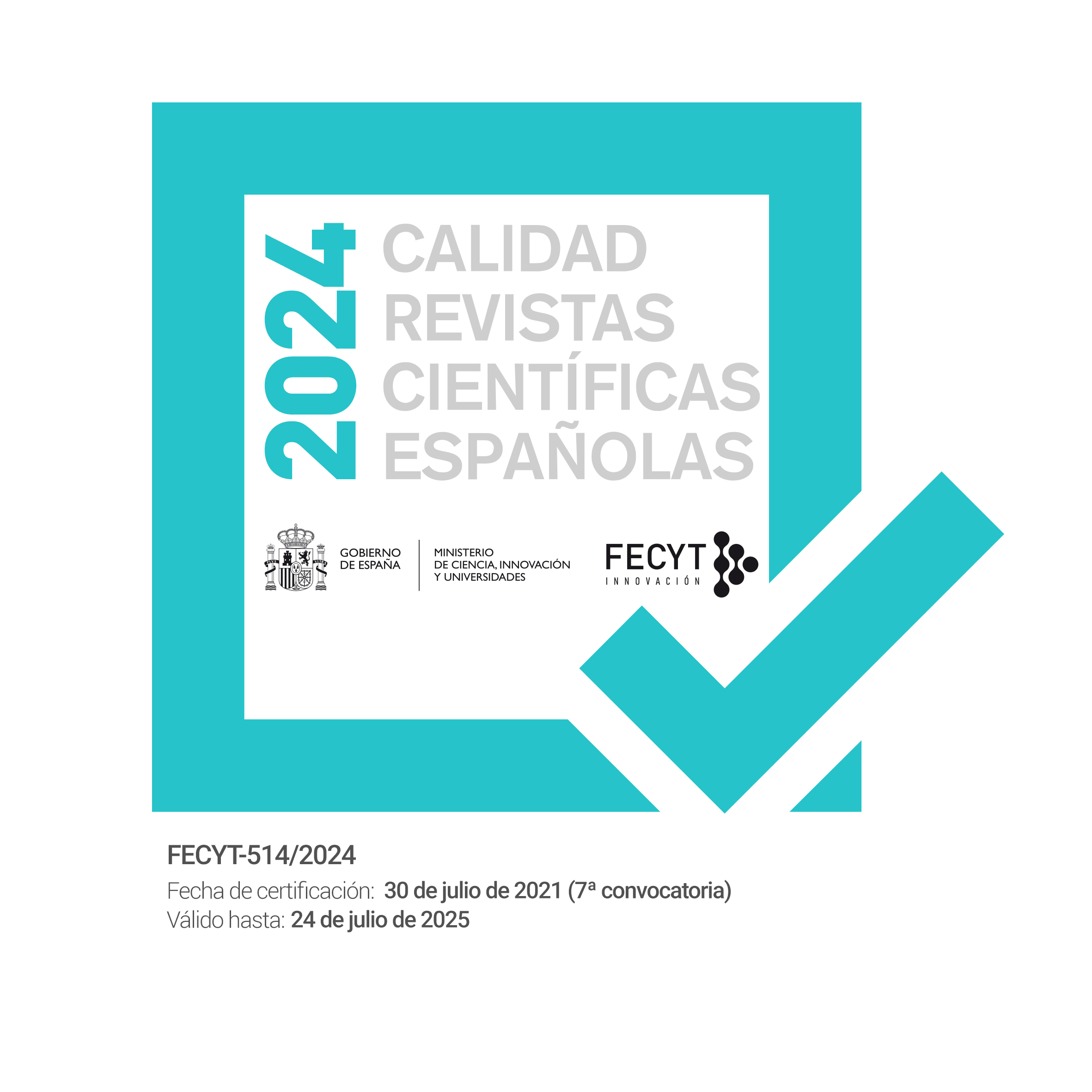RACE CONSCIOUSNESS, THE AUDACITY OF EQUALITY, AND TRANSCULTURAL CRITICISM IN HASAN MINHAJ’S HOMECOMING KING
DOI:
https://doi.org/10.12795/REN.2021.i25.13Abstract
Cultural and economic globalization has produced a ‘digimodern’ diasporic individual cohabiting multiple time-spaces in the twenty-first century. Identity development theories based on traditional notions of multiculturalism are no longer pertinent to second-generation immigrants. Based on Jeff Lewis’ (2002) concept of ‘transculturalism’ which amalgamates political aesthetics with cultural civics, this article critically analyzes the emergence of transcultural personhood in South Asian Muslim Americans, as depicted in the Netflix stand-up comedy special Homecoming King hosted by Hasan Minhaj. The article explores key concepts of transculturalism in the narration of deeply personal anecdotes built around the themes of inequality, racial injustice, and intergenerational acceptance and Minhaj’s vision of a new Brown America that allows a possibility to its transcultural inhabitants to possess multiple hybrid identities.
Downloads
References
AHMED, Riz, et al. “Coalition Unites to Define and Address Issues of Muslim Representation in Film – Pillars Fund.” Pillars Fund, 10 June 2021, pillarsfund.org/2021/06/10/coalition-unites-to-define-and-address-issues-of-muslim-representation-in-film/. Accessed 14 June 2021.
AJAYE, Franklyn. Comic Insights: The Art of Stand-up Comedy. Silman-James Press, 2002.
ANTOINE, Katja. “‘Pushing the Edge’ of Race and Gender Hegemonies through Stand-up Comedy: Performing Slavery as Anti-Racist Critique.” Etnofoor, vol. 28, no. 1, 2016, pp. 35–54.
BHABHA, Homi K. Nation and Narration. Routledge, 1990.
BHATTACHARJEE, Yudhijit. “How South Asian Americans Are Building a New American Dream.” National Geographic. September 2018, nationalgeographic.com/magazine/article/south-asian-american-stereotype-kondabolu-simpsons. Accessed 11 February 2021.
BORNS, Betsy. Comic Lives: Inside the World of American Stand-up Comedy. Simon & Schuster Inc., 1987.
BROWN, Michael K., et al. Whitewashing Race: The Myth of a Color-Blind Society. University Of California Press, 2003.
CASTELLS, Manuel. Communication Power. Oxford UP, 2009.
CHOMSKY, Noam. September 11. Allen & Unwin, 2001.
CUCCIOLETTA, D. “Multiculturalism or Transculturalism: Towards a Cosmopolitan Citizenship.” London Journal of Canadian Studies, vol. 17, 2001/2002, pp. 1-11.
CZAJKOWSKI, Elise. “Hasan Minhaj Battles Bigotry with Bittersweet Humor.” The New York Times, 28 Oct. 2015, nytimes.com/2015/11/01/arts/television/hasan-minhaj-battles-bigotry-with-bittersweet-humor.html. Accessed 11 February 2021.
DAUBE, Matthew. Laughter in Revolt: Race, Ethnicity, and Identity in the Construction of Stand-up Comedy. PhD diss., Stanford University, 2010.
DOUBLE, Oliver, editor. Getting the Joke: The Inner Workings of Stand-up Comedy. Bloomsbury, 2014.
ECHEVERRÍA, Bolívar. Definición de la cultura. Curso de filosofía y economía 1981-1982. Itaca, 2001.
GILBERT, Joanne R. Performing Marginality: Humor, Gender, and Cultural Critique. Wayne State UP, 2004.
HALL, Stuart. “Cultural Studies and its Theoretical Legacies.” Stuart Hall: Critical Dialogues in Cultural Studies. Ed. David Morley and Kuan-Hsing Chen. Routledge, 1996, pp. 262-275.
HANDIKA, Desfri. An Analysis of Figurative Language Used in Stand Up Comedy Performed by Hasan Minhaj Entitled Homecoming King. Skripsi thesis, Universitas Negeri Padang, 2019.
HUSAIN, Habeeba. “There Is Much More in a Name.” Islamic Horizons, May 2020, pp. 49-50.
ISLAM, Tasmeea, “Bad Comic, Good Comic: The Social Construction of Brownness in the Racial and Ethnic Humor of South Asian Comedians”. MA Research Paper. 24. 2018, ir.lib.uwo.ca/sociology_masrp/24. Accessed 11 February 2021.
JOHNSON, Mandee. Super Serious: An Oral History of Los Angeles Independent Stand-up Comedy. Andrews McMeel Publishing, 2020.
JOHNSON, Richard. “Three Problematics: Elements of a Theory of Working Class Culture.” Working-Class Culture: Studies in History and Theory, edited by John Clarke et al., Hutchinson, 1979, pp. 201–237.
JONES, Sam. “Hasan Minhaj’s ‘New Brown America’ Reveals Universal Relatability.” Off Camera with Sam Jones, 29 Oct. 2018, offcamera.com/issues/hasan-minhaj/listen/#.YBRFpi2l3IE. Accessed 11 February 2021.
KAY, K. “Down to Brown: A Footnote on British Asian and South Asian American Comedy”. In: New Indian Nuttahs. Palgrave Studies in Comedy. Palgrave Macmillan, 2018.
KHAN, Al-Baab, et al. “Missing & Maligned: The Reality of Muslims in Popular Global Movies.” USC Annenberg, June 2021, pp. 1–37, assets.uscannenberg.org/docs/aii-muslim-rep-global-film-2021-06-09.pdf. Accessed 14 June 2021.
KIPPOLA, Karl M. Acts of Manhood: The Performance of Masculinity on the American Stage, 1828–1865. Palgrave Macmillan, 2012.
LEWIS, Jeff. “From Culturalism to Transculturalism.” Iowa Journal of Cultural Studies, vol. 1, no. 1, 2002, pp. 14–32.
——. Crisis in the Global Mediasphere: Desire, Displeasure and Cultural Transformation. Palgrave, 2011.
——. Cultural Studies. Sage, 2008.
——. Global Media Apocalypse. Palgrave Macmillan, 2013.
——. Language Wars: The Role of Media and Culture in Global Terror and Political Violence. Pluto Books, 2005.
LIMON, John. Stand-up Comedy in Theory, Or, Abjection in America. Duke UP, 2000.
LUDWIG, Rachel A. “Stand up comedy, narrative, and pain; a case study: Homecoming King.” Senior Capstone Projects. 745. 2018. digitalwindow.vassar.edu/senior_capstone/745. Accessed 11 February 2021.
MACDONALD, James. “Comic trans: presenting and representing the other in stand-up comedy.” Live art and Performance Studies, Uniarts Helsinki, 2018.
MAHESHWARI, Laya. “The Daring Comedians Pushing Boundaries.” Www.bbc.com, 11 Sept. 2017, www.bbc.com/culture/article/20170908-the-daring-comedians-pushing-boundaries. Accessed 9 June 2021.
MCFADYEN-KETCHUM, Andrew. “Muslim Americans Take the Mic.” Poets & Writers, vol. 45, no. 1, Jan. 2017, pp. 14-18.
MICHAEL, Jaclyn. “American Muslims Stand up and Speak Out: Trajectories of Humor in Muslim American Stand-up Comedy.” Cont Islam, vol. 7, 2013, pp. 129–153.
——. “Contemporary Muslim Comedy.” Handbook of Contemporary Islam and Muslim Lives, edited by M. Woodward and R. Lukens-Bull, Springer, 2018, doi.org/10.1007/978-3-319-73653-2_41-2. Accessed 11 June 2021.
——. “Religion and Representation in the ‘New Brown America’ of Muslim Comedy.” Ecumenica, vol. 11, no. 2, 2018, pp. 62–67.
MINHAJ, Hasan. “Hasan Minhaj: Homecoming King.” Edited by Christopher Storer, Netflix Official Site, 23 May 2017, netflix.com/title/80134781.
——. “Hasan Minhaj on the American Dream Tax.” ART19, 25 Oct. 2016, art19.com/shows/the-mash-up-americans/episodes/2829347c-b8d3-4007-b41b-0bb01cdb2ca1. Accessed 11 February 2021.
——. “Hasan Minhaj Speaks on America's Fear Of Muslims, Freedom Of Speech, Bill Maher & More.” The Breakfast Club Power 105.1 FM, 8 Jun. 2017, youtu.be/gS8W4KRSvRc. Accessed 11 February 2021.
MISHRA, Sangay K. Desis Divided: The Political Lives of South Asian Americans. Minnesota UP, 2016.
MUKHERJEE, Bharati. “Immigrant Writing: Give Us Your Maximalists!” The New York Times, 28 Aug 1988, nytimes.com/1988/08/28/books/immigrant-writing-give-us-your-maximalists.html. Accessed 11 February 2021.
NEALE, R. S. “Cultural Materialism: A Critique.” Social History, vol. 9, no. 2, 1984, pp. 199–215.
OMI, Michael, and Howard Winant. Racial Formation in the United States, Routledge, 2015.
PARKER, Bethany. “Probing Question: What Are the Roots of Stand-up Comedy?” Penn State University, 12 Sept. 2008, news.psu.edu/story/141330/2008/09/12/research/probing-question-what-are-roots-stand-comedy. Accessed 9 June 2021.
QUIRK, Sophie. The Politics of British Stand-up Comedy: The New Alternative. Palgrave Macmillan, 2018.
——. Why Stand-up Matters: How Comedians Manipulate and Influence. Bloomsbury, 2015.
RAO, Mallika. “Is It Time To Retire Apu?” Huffpost, 23 Jan. 2014, huffpost.com/entry/the-simpsons-apu-racist_n_3956603. Accessed 11 February 2021.
SAENZ DE SICILIA, Andrés, and Sandro Brito Rojas. “Production=Signification: towards a Semiotic Materialism.” Language Sciences, vol. 70, 2018, pp. 131–142.
SHARMA, Nitasha Tamar. Hip Hop Desis: South Asian Americans, Blackness, and a Global Race Consciousness. Duke UP, 2010.
SLIMBACH, Richard. “The Transcultural Journey.” Frontiers: The Interdisciplinary Journal of Study Abroad, vol. XI, 2005, pp. 205–230.
SMITH, Daniel R. Comedy and Critique: Stand-up Comedy and the Professional Ethos of Laughter. Bristol UP, 2018.
THOMAS, James M. “Laugh through It: Assembling Difference in an American Stand-up Comedy Club.” Ethnography, vol. 16, no. 2, 2015, pp. 166–186.
VIGOUROUX, Cecile B. “Genre, Heteroglossic Performances, and New Identity: Stand-up Comedy in Modern French Society.” Language in Society, vol. 44, no. 2, 2015, pp. 243–272.
VINCENTY, Samantha. “Being ‘Color Blind’ Doesn’t Make You Not Racist—in Fact, It Can Mean the Opposite.” Oprah Daily, 12 June 2020, www.oprahdaily.com/life/relationships-love/a32824297/color-blind-myth-racism/. Accessed 21 Sept. 2021.
WINGFIELD, Adia Harvey. “Color Blindness Is Counterproductive.” The Atlantic, 13 Sept. 2015, www.theatlantic.com/politics/archive/2015/09/color-blindness-is-counterproductive/405037/. Accessed 21 Sept. 2021.
WITTGENSTEIN, Ludwig. Philosophical Investigations. Blackwell, 1953.
ZOGLIN, Richard. Comedy at the Edge: How Stand-up in the 1970s Changed America. Bloomsbury, 2008.















